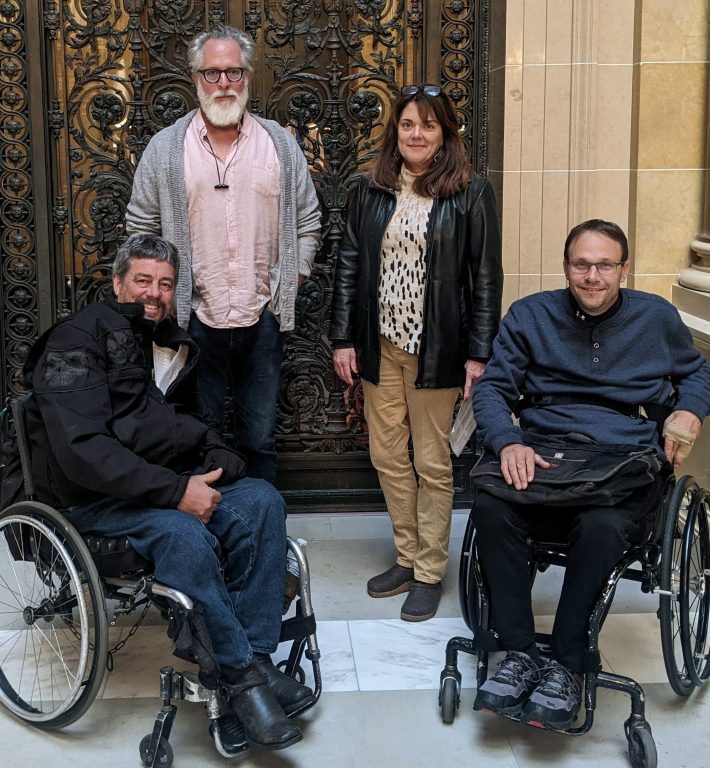Congress Cuts Spinal Injury Research for Veterans, a Loss for Marquette
$40 million in federal cuts means MU research program will lose funding.

Unite 2 Fight Paralysis advocates petitioned Rep. Paul Tittl in Wisconsin to support new legislation. Photo courtesy of Unite 2 Fight Paralysis
Advocates for patients with spinal cord injuries are raising the alarm over a $40 million research program they said was quietly cut from a Department of Defense office that funds medical research.
“We vehemently believe that spinal cord injury is terribly underfunded,” said Matthew Rodreick, executive director of the Minneapolis nonprofit Unite 2 Fight Paralysis. “Especially relative to the cost associated with paralysis.”
The Defense Department’s Spinal Cord Injury Research Program is unique because it prioritizes funding studies that will directly help patients and incorporates insights from patient advocates, Rodreick said.
“From the community perspective, that’s what we want science to do … deliver novel therapies or changes to treatment that would be meaningful,” said Rodreick, whose son has a quadriplegic spinal cord injury.
In Wisconsin, the cuts leave researchers with fewer funding sources. Along with ongoing federal funding uncertainty, scientists said that could hurt spinal injury research in the state.

Advocates with Unite 2 Fight Paralysis petition for legislation they hope ultimately helps people with spinal cord injuries. From left: John Martinson, Matthew Rodreick, Bethany Renaud Sullivan and Dan Hellenbrand. Photo courtesy of Unite 2 Fight Paralysis
The program’s funding is managed by the Department of Defense’s Congressionally Directed Medical Research Programs, or CDMRP. The office was directed by Congress to fund 12 chosen programs for fiscal year 2025, which did not include the spinal injury program, a spokesperson said in a statement to WPR.
“The CDMRP does not negotiate topic areas with Congress,” the spokesperson said.
Murray Blackmore of Marquette University has served on review panels for applications vying for funding from the spinal cord injury research program. His lab studies gene therapies for spinal injury.
“If you’re going to cut something, I just can’t believe that you would start with a hyper-efficient, hyper-effective program aimed at service members,” Blackmore said.
He said he supports taking a “hard look” at government efficiency and cutting waste.
“The truth is, I’m sort of politically aligned with that way of thinking,” Blackmore said. “It’s just that this specific program is, first of all, so results-oriented and so effective .… and we’re talking about soldiers injured in the line of duty.”
Kristi Streeter is an assistant professor at Marquette University. Her application to the Spinal Cord Injury Research Program was recommended for funding in fiscal year 2024. She studies how spinal cord injuries affect breathing.
“We often don’t think about the impacts of spinal cord injury on breathing, but they’re pretty significant,” she said.
She said funding sources like the spinal cord injury program are important for the field.
“If multiple sources aren’t there, some labs may not be able to sustain their research studies in spinal injury,” she said. “That would translate to less labs doing spinal injury work. So … that would have a potential big impact on the field, on patients.”
Congress cuts $40M for spinal injury research for veterans, threatening Wisconsin research was originally published by Wisconsin Public Radio.
If you think stories like this are important, become a member of Urban Milwaukee and help support real, independent journalism. Plus you get some cool added benefits.






















The profound cruelty of this action is mind boggling.
Why would anyone volunteer for a military service if they knew they would be tossed on the woodpile if injured.
SHAME on everyone involved in this decision! SHAME